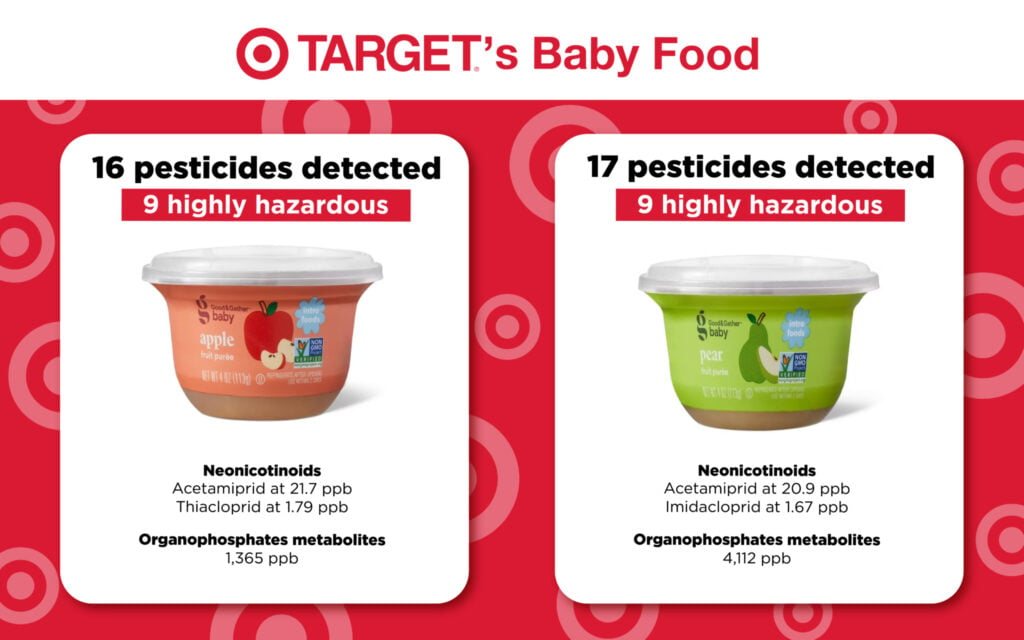Toxic Pesticides Found in Baby Food
The food babies consume is essential for brain growth, body growth, development, and energy. Baby food is not a place for toxic pesticides. However, recent reports have shown dangerous levels in Target brand baby food. Here’s what you need to know.

Pesticides in Baby Food
A recent study and report by Friends of the Earth showed that Target’s Good & Gather brand baby foods are contaminated with 21 harmful pesticides.
When Good & Gather brand Baby Apple Fruit Puree and Baby Pear and Fruit Puree were sent to an independent lab for testing, twelve pesticides were found on the PAN International List of Highly Hazardous Pesticides.
Some of the most concerning toxins in the tested baby foods were neonicotinoids, organophosphates, fungicides, and nine other insecticides and acaricides. Here’s the breakdown of the effects of these harmful pesticides.
Neonicotinoids are neurotoxic pesticides used in agriculture, lawns, and flea pet treatments. They work by binding to the nerve cells of insects and destroying them with overstimulation and are some of the most deadly pesticides available. Along with the pests they are meant to harm, they also harm bees, butterflies, birds, and fish. They also cause birth defects in white-tailed deer. This class of pesticides has been linked to impacts on developing fetuses and children causing ADHD, nervous system and endocrine disruptions, congenital heart defects, and neural tube defects.
Organophosphates are chemical compounds used in herbicides, pesticides, and insecticides. They are also the main components of nerve gas. The breakdown of these pesticides is called metabolites, found in 100% of the Good & Gather baby foods tested, showing significant usage of these toxic chemicals. Even low levels of exposure to a developing brain are so toxic that scientists have called for a ban. These metabolites are linked to low IQ, developmental delays, Alzheimer’s, Parkinson’s, and hormone disruption. They are also toxic to pollinators and wildlife.
Nine different types of fungicides were found in Target’s baby food, including pyrimethanil. This fungicide is a concern to human health because it has antiandrogenic properties and could disrupt the endocrine system.
Five other insecticides and acaricides that are highly toxic to bees were found in the baby food sent for testing, and three are considered highly toxic to aquatic organisms. This shows that Target is also irresponsible when it comes to environmental concerns.
Why Pesticides are Bad For Babies
“Ten of the pesticides we found are linked to endocrine disruption. Incredibly small amounts of endocrine disrupting chemicals – the equivalent to one drop in 20 Olympic swimming pools – can alter our brain development, hormones, immune systems, and more.” – Friends of the Earth
Since babies are growing rapidly, their small bodies are susceptible to harm from the toxins they consume. The amount of toxic pesticides in Target’s baby food is alarming and should be banned. Eight pesticides in this study are already banned in the European Union, showing that higher standards can and should be attained.
Pesticides are meant to poison, and they do just that regardless of whether garden pests, pollinators, or humans consume them. Since babies are so small, even small amounts and early exposure to toxic pesticides can have long-term impacts.
Babies consume more pesticides per pound of body weight than adults, and their kidneys and liver can’t remove pesticides from their bodies as well as adults, and the long-term exposure risks are very concerning.
Prenatal exposure to pesticides can lead to:
- birth defects
- low birth weight
- fetal death
- Preterm birth
- Congenital anomalies
Exposure to pesticides during childhood can lead to:
- attention problems
- learning delays
- respiratory issues
- neurobehavior deficits
- gross motor delay
- hormone disruption
- pediatric cancers
What Can We Do?
Parents have so much to worry about already, and it’s abhorrent to think that we may be harming our babies with the simple act of feeding them. Homemade baby food is always a great option, but not everyone always has the time or bandwidth to keep up with it full-time.
“There is evidence that the contamination of Target’s baby food is part of a larger problem that impacts multiple brands,” said Sarah Starman, senior food and agriculture campaigner at Friends of the Earth. She pointed to a 2023 Environmental Working Group study that tested baby food from Gerber’s, Parent’s Choice, and Beech-Nut, and found pesticides in 38% of the conventional samples and 0% of the organic samples. “Eating USDA-certified organic food has been shown to reduce dietary exposure to pesticides dramatically, as more than 900 synthetic pesticides allowed in conventional agriculture are banned in organic agriculture. A trusted company like Target can and must do more to advance organic agriculture in its supply chain and make organic food available and affordable for all families.”
Reducing pesticide exposure by eating locally grown organic foods and ensuring that your home is set up to protect your kids from pesticides can make big differences. However, to make reduced pesticide exposure accessible to everyone, demanding that corporations be more responsible with their power is important and necessary.
Target is popular amongst moms, and the corporation markets directly to them. As a brand, parents should be able to trust that Target’s products are safe for their families. Target has major purchasing power, so it should be responsible for its most vulnerable consumers by phasing out toxic pesticides.
